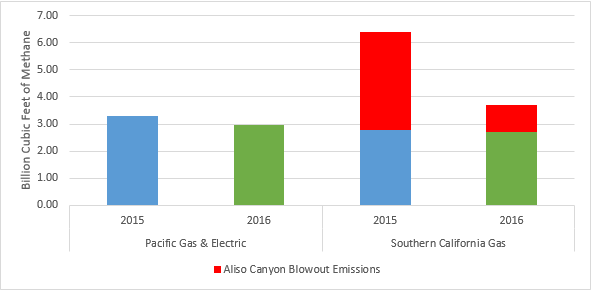EDF Schneider fellow Scott Roycroft co-authored this post
California’s gas utilities have had their share of problems in recent years – so improvements in environmental impacts, operations, and safety are important to track.
In 2014, the California legislature passed a law to require utility companies to publicly disclose data on gas leaks and emissions while working to actually cut those emissions. Now, three years later, utility reporting has been standardized, an emissions trend has emerged, and the results are significant.

Graphic 1: A depiction of the volume of methane emissions from California utilities between 2015 and 2016. Emissions from the Aliso Canyon blowout are shown as a separate category.












 Since the 1892 discovery of oil in California, the oil and gas industry has been a major economic engine and energy supplier for the state. Although this oil and gas production may be broken down into dollars and barrels, it doesn’t tell the story of the potential impact of drilling activity on the lives of the people in Los Angeles and the Central Valley who live right next to these operations.
Since the 1892 discovery of oil in California, the oil and gas industry has been a major economic engine and energy supplier for the state. Although this oil and gas production may be broken down into dollars and barrels, it doesn’t tell the story of the potential impact of drilling activity on the lives of the people in Los Angeles and the Central Valley who live right next to these operations.
